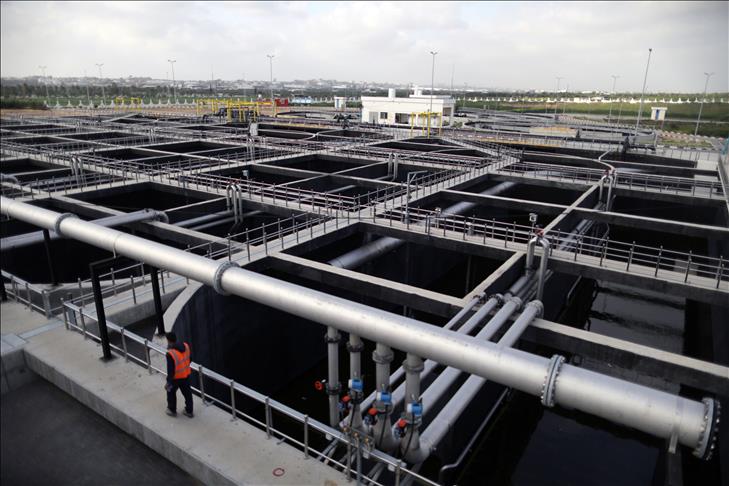
by E. Gurkan Abay & Selen Tonkus
ANKARA
Increasing tensions in Ukraine concerns Europe over its energy security and causes fear of a Russian embargo on the natural sources it supplies.
The EU, the world’s biggest energy consumer, spends nearly $800 billion on energy imports every year. Russia exports natural gas, oil and coal to Europe, supplying 22 percent of its energy alone, according to an Anadolu Agency analysis of data provided by the International Energy Agency, a Paris-based autonomous intergovernmental organization.
While Russia also supplies nearly 30 percent of Europe’s natural gas, 60 percent of this gas transits through Ukraine.
Ukraine plays a "key role" in the natural gas needs of the European countries with five out of the 12 pipelines supplying natural gas to Europe. Three of these pipelines go directly to Finland, Estonia and Latvia. Four pipelines go through Belarus, Lithuania and Poland and the remaining five pipelines travel through Ukraine before reaching Europe.
Additionally, as Europe’s "industrial locomotive," Germany, is the biggest importer of Russian gas via the Nord Stream pipeline.
Russia is also the most important player for Europe’s fossil fuel needs. The country supplies one third of Europe’s oil and 25 percent of its coal.
EU seeks diversification
In light of these facts, the energy ministers of the G7 group of the world's wealthiest industrial nations met in Rome on Tuesday to discuss alternatives to Russian natural gas supplies. As a result of the meeting, the ministers affirmed several principles that it said would lead to energy security. These principles include the diversification of sources, reducing greenhouse gas emissions, accelerating the transition to a low-carbon economy and promoting clean and sustainable energy.
The Southern Gas Corridor project, which is set to open in 2019, has gained increasing importance for Europe as events in Ukraine have highlighted the need for the continent to diversify its energy supply.
"The pipeline is planned to transport a minimum of 10 billion cubic meters of new sources of gas from the Caspian Region annually, crossing Georgia and Turkey," said Nicole Bockstaller, press officer for EU's top energy official.
She added: "The gas will ultimately reach EU markets through two possible routes: one crossing South-East Europe and reaching Austria, the other one reaching Italy through the Adriatic Sea."
The Southern Gas Corridor is estimated to cost around $45 billion. A future expansion of the project is planned -- by adding natural gas from northern Iraq, Turkmenistan, the Eastern Mediterranean and possibly Iran.
Norway gains further importance
As the world’s fifth biggest oil exporter and second biggest natural gas exporter after Russia, Norway gained further importance for the energy security of Europe. Among the EU's alternatives, increasing oil and gas imports from Norway has allowed the country to gain the potential role of being Europe’s biggest gas supplier.
Meanwhile, the average usage of renewable energy in EU countries is at 14 percent, according to March data from Europe's statistics authority, EuroStat.
The EuroStat report revealed that by 2020, Europe plans to supply 20 percent of its energy from renewable sources with Norway and Sweden being one of the leading countries in using renewable energy.
Russia also dependent on Europe
Russia earns $ 400 billion yearly from energy exports and one fifth of its income is from exporting energy to Europe. Russian energy giant Gazprom transports the gas to Europe via the longest pipeline system in the world -- 168 thousand kilometers long.
Liquefied Natural Gas (LNG) and coal alternatives
Experts shared comments with the Anadolu Agency regarding the energy relations between Russia and EU.
Prof. Claudia Kemfert, from Germany’s Economic Researches Institute, said liquefied natural gas, or LNG, is the biggest short-term alternative to Russian gas. Kemfert emphasized that Europe also needs to improve its gas pipeline system especially the transport routes from the West to the East by allowing reverse flow options. She added that Europe needs to reduce fossil fuel imports by improving energy efficiency and an increased share of renewable energy.
Jack Sharples, an energy expert from Glasgow University, said European gas consumers could switch from gas to coal in the long term to reduce dependency, although this would have an impact on the ability of the EU and its member states to meet their CO2 emissions reduction goals.
Underlining that a diversification away from Russian energy can only be limited in the short term, Sharples said, "it would take serious political and commercial effort, and even then a complete independence from Russian energy supplies would not be possible."
According to Amanda Paul from the European Policy Center, Russia is using its status as an energy superpower to "hold other countries to ransom" and steps are needed to be taken to change this situation.
englishnews@aa.com.tr
Anadolu Agency website contains only a portion of the news stories offered to subscribers in the AA News Broadcasting System (HAS), and in summarized form. Please contact us for subscription options.

